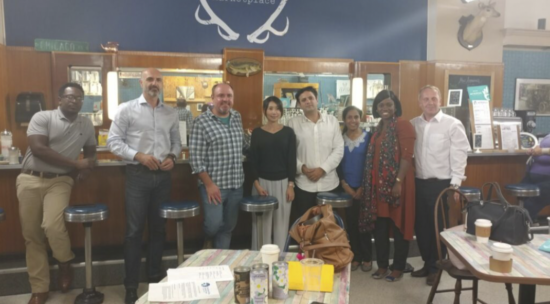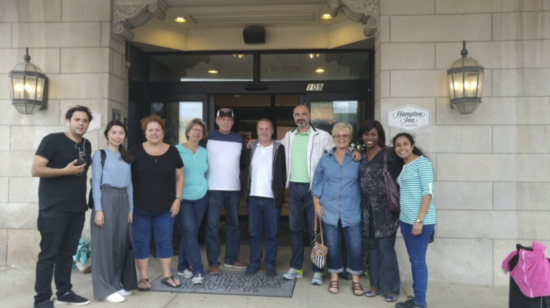Editor’s note: Renee Buisker is a volunteer with the Freeport Area International Visitors Council, a Global Ties U.S. Community-Based Members in Freeport, Illinois. Her family has been involved with hosting international visitors for more than 50 years and supporting international exchange programming in the local community. We spoke with Renee about her long history with exchange programming, building community in the U.S. and abroad, and why exchange matters.
Your family has been involved with hosting international visitors through the Freeport Area International Visitors Council for more than 50 years. Can you tell us how that started?
The first visitors we hosted were from Taiwan, and they came to our home in 1969. I was 14-years-old. Their names were Tony and Teresa Chang. They came through an International Fellowship Program through the University of Chicago, which placed international visitors with American families over the holiday period. Tony did not speak much English; I remember he carried an English dictionary with him. Their daughter was just two-years-old and I remember she would only eat potato chips and ice cream. That was how it started, and we have remained close with that family for over 50 years. We have developed lots of special relationships through all of these years, but Tony and Teresa were the first ones.
How did your family’s involvement with international visitors continue over the years? Can you share any examples or stories of relationships that were built and the impact they had?
Hosting international visitors was really an eye-opening experience for our family, and my parents kept doing it after that first time. Once I grew up and married, I convinced my husband to try it, too, and we hosted many students and visitors through youth programs. Eventually, it expanded to government guests and diplomats, too, through the International Visitor Leadership Program (IVLP). Some of the visitors came to us for a few days, some for a few weeks. I kept track until we got to 150 guests total, and then I lost count. I would say, all told, we hosted close to 170 people in our homes over those years, from all over the world.
My husband and I went to Europe three times over the years and each time stayed with people we had hosted through international exchange programs. When my son and daughter graduated from high school, we got them each a ticket to Europe for their graduation and they traveled around and stayed with people we had hosted.
As I said, we stayed in touch the whole time with Tony and Teresa Chang. I remember visiting Tony’s office with my husband a few decades ago and Tony had a picture of my Dad on his wall, where other people had pictures of famous people; that’s how special my Dad was to him. I visited Tony in Hawaii (where he lives now) and he met my kids for the first time. He called me as recently as a few weeks ago when my mom passed, and sent flowers for her funeral. Our families always remained so close, from that first visit to our home.
-

International Visitor Leadership Program (IVLP) participants take a group photo before lunch. Photo photos provided by Renee Buisker.
- What happened with COVID, when in-person programs had to stop?
One of the big downsides over the past few years has been that this kind of interaction has not been possible in the same way. Zoom really takes away so much from the personal relationships that can develop. Sitting across the kitchen table from someone, and drinking a cup of coffee, that’s how you get to know someone, and that’s really how it happened with the relationships that developed. Now, some programs are coming back. I do stay involved with the Freeport Area International Visitors Council, but in a different way.
-

A group of international visitors pose in front of their hotel in Freeport, IL.
When you reflect on these experiences and these relationships, why do you think they matter?
The knowledge we have gained about people, and about the world, is tremendous. Ultimately, we all want the same thing. Families here or around the world, they all want health, and happiness, and peace; it’s the same wish everywhere. I have done this for so long because I want people around the world to get to know real Americans; not the ones they see on TV or in the media. Real Americans, to me, are regular people who want peace and understanding, and who believe we can live together in harmony and prosperity.
This has been an opportunity for me to learn about and enjoy people from different places, and to learn about the world. My kids have had this experience and they have never been afraid to go out in the world. They were used to having different people in the house, and even if they didn’t speak the same language, they could always find a way to communicate—they could draw pictures, they could find some way to laugh together. It sometimes took effort to communicate, but we figured it out; it can always be done. And it’s really been worth it to have these people in our lives.
